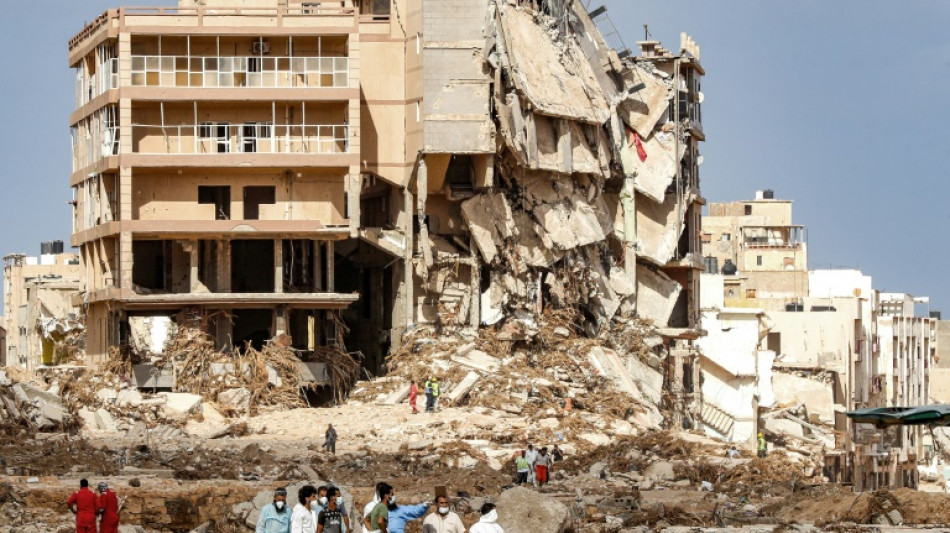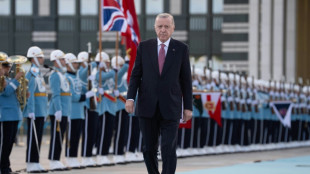
-
 World champions South Africa add Mbonambi, Mchunu to squad
World champions South Africa add Mbonambi, Mchunu to squad
-
Greenpeace says French uranium being sent to Russia

-
 'Now You See Me' sequel steals N. American box office win
'Now You See Me' sequel steals N. American box office win
-
Argentina beat Scotland after frenzied fightback

-
 Argentina beat Scotland after stunning fightback
Argentina beat Scotland after stunning fightback
-
Pope urges leaders not to leave poor behind

-
 Pressure will boost Germany in 'knockout' Slovakia clash, says Nagelsmann
Pressure will boost Germany in 'knockout' Slovakia clash, says Nagelsmann
-
Ecuador votes on hosting foreign bases as Noboa eyes more powers

-
 Portugal qualify for 2026 World Cup by thrashing Armenia
Portugal qualify for 2026 World Cup by thrashing Armenia
-
Greece to supply winter gas to war battered Ukraine

-
 India and Pakistan blind women show spirit of cricket with handshakes
India and Pakistan blind women show spirit of cricket with handshakes
-
Ukraine signs deal with Greece for winter deliveries of US gas

-
 George glad England backed-up haka response with New Zealand win
George glad England backed-up haka response with New Zealand win
-
McIlroy loses playoff but clinches seventh Race to Dubai title

-
 Ecuador votes on reforms as Noboa eyes anti-crime ramp-up
Ecuador votes on reforms as Noboa eyes anti-crime ramp-up
-
Chileans vote in elections dominated by crime, immigration

-
 Turkey seeks to host next COP as co-presidency plans falter
Turkey seeks to host next COP as co-presidency plans falter
-
Bezzecchi claims Valencia MotoGP victory in season-ender

-
 Wasim leads as Pakistan dismiss Sri Lanka for 211 in third ODI
Wasim leads as Pakistan dismiss Sri Lanka for 211 in third ODI
-
Serbia avoiding 'confiscation' of Russian shares in oil firm NIS

-
 Coach Gambhir questions 'technique and temperament' of Indian batters
Coach Gambhir questions 'technique and temperament' of Indian batters
-
Braathen wins Levi slalom for first Brazilian World Cup victory

-
 Rory McIlroy wins seventh Race to Dubai title
Rory McIlroy wins seventh Race to Dubai title
-
Samsung plans $310 bn investment to power AI expansion

-
 Harmer stars as South Africa stun India in low-scoring Test
Harmer stars as South Africa stun India in low-scoring Test
-
Mitchell ton steers New Zealand to seven-run win in first Windies ODI

-
 Harmer stars as South Africa bowl out India for 93 to win Test
Harmer stars as South Africa bowl out India for 93 to win Test
-
China authorities approve arrest of ex-abbot of Shaolin Temple

-
 Clashes erupt in Mexico City anti-crime protests, injuring 120
Clashes erupt in Mexico City anti-crime protests, injuring 120
-
India, without Gill, 10-2 at lunch chasing 124 to beat S.Africa

-
 Bavuma fifty makes India chase 124 in first Test
Bavuma fifty makes India chase 124 in first Test
-
Mitchell ton lifts New Zealand to 269-7 in first Windies ODI

-
 Ex-abbot of China's Shaolin Temple arrested for embezzlement
Ex-abbot of China's Shaolin Temple arrested for embezzlement
-
Doncic scores 41 to propel Lakers to NBA win over Bucks

-
 Colombia beats New Zealand 2-1 in friendly clash
Colombia beats New Zealand 2-1 in friendly clash
-
France's Aymoz wins Skate America men's gold as Tomono falters

-
 Gambling ads target Indonesian Meta users despite ban
Gambling ads target Indonesian Meta users despite ban
-
Joe Root: England great chases elusive century in Australia

-
 England's Archer in 'happy place', Wood 'full of energy' ahead of Ashes
England's Archer in 'happy place', Wood 'full of energy' ahead of Ashes
-
Luxury houses eye India, but barriers remain

-
 Budget coffee start-up leaves bitter taste in Berlin
Budget coffee start-up leaves bitter taste in Berlin
-
Reyna, Balogun on target for USA in 2-1 win over Paraguay

-
 Japa's Miura and Kihara capture Skate America pairs gold
Japa's Miura and Kihara capture Skate America pairs gold
-
Who can qualify for 2026 World Cup in final round of European qualifiers

-
 UK to cut protections for refugees under asylum 'overhaul'
UK to cut protections for refugees under asylum 'overhaul'
-
England's Tuchel plays down records before final World Cup qualifier

-
 Depoortere double helps France hold off spirited Fiji
Depoortere double helps France hold off spirited Fiji
-
Scotland face World Cup shootout against Denmark after Greece defeat

-
 Hansen hat-trick inspires Irish to record win over Australia
Hansen hat-trick inspires Irish to record win over Australia
-
Alcaraz secures ATP Finals showdown with 'favourite' Sinner


Climate change, conflict made Libya deluge more likely: study
Climate change made torrential rains that triggered deadly flooding in Libya up to 50 times more likely, new research said Tuesday, noting that conflict and poor dam maintenance turned extreme weather into a humanitarian disaster.
An enormous wave of water struck the city of Derna after heavy rains on September 10 overwhelmed two dams, washing whole buildings and untold numbers of inhabitants into the Mediterranean Sea.
Scientists from the World Weather Attribution group said a deluge of the magnitude seen in northeastern Libya was an event that occurred once every 300-600 years.
They found that the rains were both more likely and heavier as a result of human-caused global warming, with up to 50 percent more rain during the period.
In a report looking at floods linked to Storm Daniel that swept across large parts of the Mediterranean in early September, they found that climate change made the heavy rainfall up to 10 times more likely in Greece, Bulgaria and Turkey and up to 50 times more likely in Libya.
But researchers stressed that other factors, including conflict and poor dam maintenance, turned the "extreme weather into a humanitarian disaster".
To unpick the potential role of global warming in amplifying extreme events, the WWA scientists use climate data and computer modelling to compare today's climate -- with roughly 1.2 degrees Celsius of heating since pre-industrial times -- to that of the past.
WWA scientists are normally able to give a more precise estimate of the role climate change has played -- or its absence -- in a given event.
But in this case they said the study was limited by a lack of observation weather station data, particularly in Libya, and because the events occurred over small areas, which are not as accurately represented in climate models.
That meant the findings have "large mathematical uncertainties", although the study said researchers were "confident that climate change did make the events more likely", because of factors including that current warming is linked to a 10-percent increase in rainfall intensity.
- 'Bigger impacts' -
"After a summer of devastating heatwaves and wildfires with a very clear climate change fingerprint, quantifying the contribution of global warming to these floods proved more challenging," said Friederike Otto of the Grantham Institute at Imperial College London.
"But there is absolutely no doubt that reducing vulnerability and increasing resilience to all types of extreme weather is paramount for saving lives in the future."
Daniel, which scientists said was the deadliest and costliest storm over the Mediterranean and Africa on record, formed in the eastern Mediterranean, causing deadly flooding across the region for the first 10 days of September.
The study said the magnitude of the impacts was driven by the vulnerability and exposure of communities and infrastructure.
For example, in central Greece, the damage was increased because cities are located in flood-prone areas.
In Libya, where the death toll in Derna alone has exceeded 3,300 and is expected to rise, the authors noted that "long-lasting armed conflict, political instability, potential design flaws and poor maintenance of dams all contributed to the disaster".
"This devastating disaster shows how climate change-fueled extreme weather events are combining with human factors to create even bigger impacts, as more people, assets and infrastructure are exposed and vulnerable to flood risks," said Julie Arrighi, director at the Red Cross Red Crescent Climate Centre.
K.AbuTaha--SF-PST




